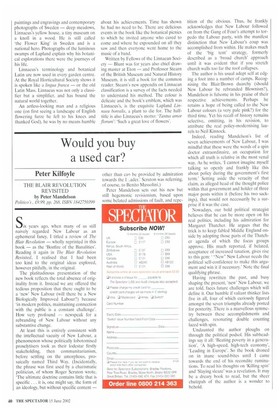Would you buy a used car?
Peter Kilfoyle
THE BLAIR REVOLUTION REVISITED by Peter Mandelson Politico's, £9.99, pp. 268, ISBN 1842750399 Six years ago, when many of us still naively regarded New Labour as an ephemeral fancy, I titled a review of The Blair Revolution — wholly reprinted in this book — as the 'Bonfire of the Banalities'. Reading it again in The Blair Revolution Revisited, I realised that I had been too kind to the original ideas explored, however pitifully, in the original.
The platitudinous presentation of the new book reflects the total absence of originality from it. Instead we are offered the tedious proposition that there ought to be a 'new' New Labour (will there be a New Biologically Improved Labour?) because 'in modern politics, maintaining connection with the public is a constant challenge'. How very profound — newspeak for a rebranding of New Labour without any substantive change.
At least this is entirely consistent with the intellectual vacuity of New Labour, a phenomenon whose politically lobotomised proselytisers took as their lodestar firstly stakeholding, then communitarianism, before settling on the amorphous, prosaically named Third Way. (Incidentally, the phrase was first used by a charismatic politician, of whom Roger Scruton wrote, 'The ultimate doctrine contains little that is specific . . . it is, one might say, the form of an ideology, but without specific content — other than can be provided by admiration towards the I Scruton was referring, of course, to Benito Mussolini.) Peter Mandelson sets out his new but still hegemonic revisionism, based upon some belated admissions of fault, and repe tition of the obvious. Thus, he frankly acknowledges that New Labour followed on from the Gang of Four's attempt to torpedo the Labour party, with the manifest distinction that New Labour's coup was accomplished from within. He makes much of the 'big tent' strategy, formerly described as a 'broad church' approach until it was evident that if you stretch church walls too far the roof collapses.
The author is his usual adept self at edging a foot into a number of camps. Recognising the Blair/Brown duarchy (should New Labour be rebranded Blownism?), Mandelson is fulsome in his praise of their respective achievements. Perhaps he retains a hope of being called to the New Labour colours (a very pale pink?) for the third time. Yet his recall of history remains selective, omitting, in his revision, to attribute the real policy-modernising laurels to Neil Kinnock.
Indeed, reading Mandelson's list of seven achievements of New Labour, I was mindful that these were the words of a spin doctor extraordinaire, an occupation for which all truth is relative in the most venal way. As he writes, 'I cannot imagine myself talking so openly and frankly like this about policy during the government's first term.' Setting aside the veracity of that claim, as alleged head of the thought police within that government and holder of three major posts within it (before his two sackings), that would not necessarily be a surprise if it was the case.
Nowadays, our bold political strategist believes that he can be more open on his real politics, including his admiration for Margaret Thatcher. He argues that the trick is to keep fabled Middle England onside by adopting those parts of the Thatcher agenda of which the focus groups approve. His much reported, if belated, acceptance of increased taxation, gives rise to this gem:' "New" New Labour needs the political self-confidence to make this argument and win it if necessary.' Note the final qualifying phrase.
Having rewritten the past, and busy shaping the present, 'new' New Labour, we are told, faces future challenges which will define it. Our humble if valiant thinker lists five in all, four of which curiously figured amongst the seven triumphs already posted for posterity. There is a marvellous symmetry between these accomplishments and challenges, resonating double counting laced with spin.
Undaunted the author ploughs on through the political podsol. His subheadings say it all: 'Beating poverty in a generation', 'A high-speed, high-tech economy', 'Leading in Europe'. So the book droned on in inane sound-bites until I came towards the end of his recondite ruminations. To read his thoughts on 'Killing spin' and 'Slaying sleaze' was a revelation. It may be a dreary book to read, but the sheer chutzpah of the author is a wonder to behold.


































































 Previous page
Previous page